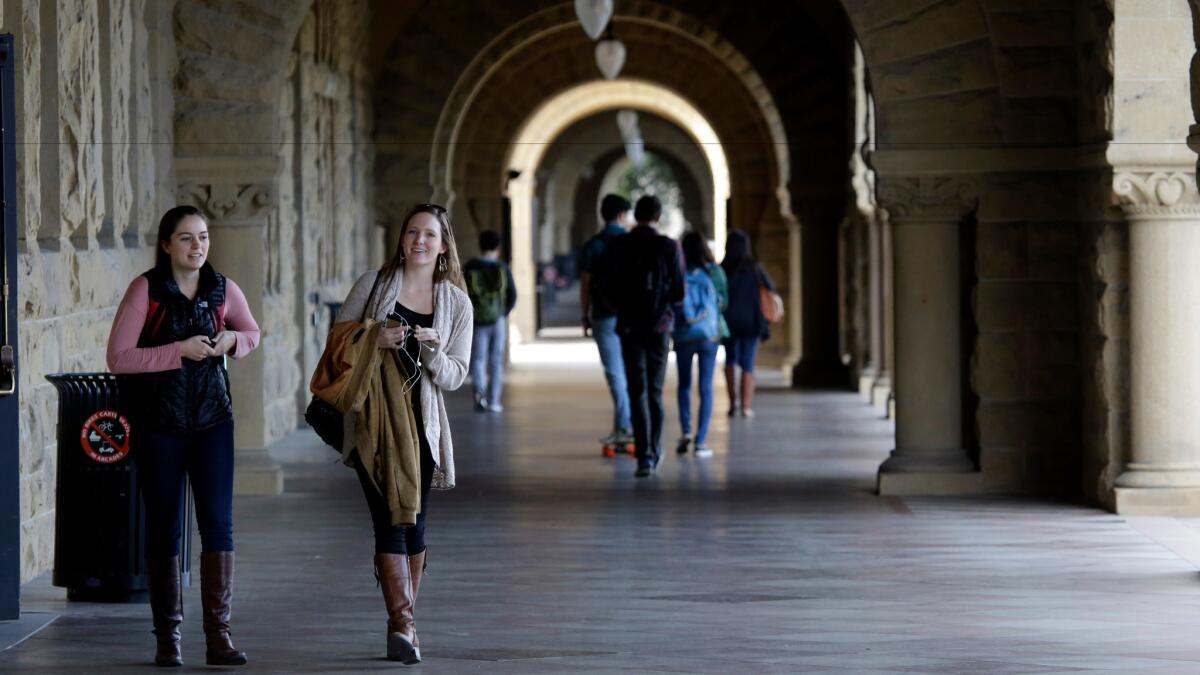Column: The dangerous irony of rape accusation culture

- Share via
By now, there’s no way you’ve missed the story of Brock Turner, a 20-year-old Stanford swimmer and former Olympic hopeful who in January 2015 was discovered (and chased down) by fellow students as he assaulted an unconscious, partially clothed woman behind a dumpster after a fraternity party. In March, Turner was found guilty of three counts of felony sexual assault, including attempt to rape an intoxicated woman and sexually penetrating an unconscious person with a foreign object.
Prosecutors asked for a sentence of six years in state prison, but last week, Santa Clara County Superior Court Judge Aaron Persky sentenced Turner to six months in county jail and three years of probation. In explaining his decision, Persky cited character references supplied by Turner’s friends and family as well as Turner’s age and lack of criminal history. “A prison sentence would have a severe impact on him,” Persky said. “I think he will not be a danger to others.”
Those remarks alone would have been enough to set the Internet ablaze. But when some of those character references, along with a long, impassioned statement from the victim, were made public, social media snapped into vigilante mode. Turner and his family were pilloried as monsters of privilege, and a petition calling for Persky’s impeachment gathered hundreds of thousands of signatures. The victim’s statement — she has been identified only as Emily Doe — immediately went viral.
Despite the rather tedious nature of social media-fueled breathlessness and indignation, the fervency of the public response is understandable. The victim’s words are powerful. And Turner’s character references could scarcely have been clumsier. In a disastrous effort to parse words, the defendant’s father referred to the assault as “20 minutes of action,” bemoaned his son’s loss of appetite and had nothing to say about the victim. A childhood friend of Turner’s chalked up the accusations to political correctness, and in a phrase that would have had even Yogi Berra scratching his head, suggested that “rape on campus isn’t always because people are rapists.”
The assault Turner committed isn’t questionable. Emily Doe did not rewrite history or reframe reality.
Actually, rape is committed by rapists, just as theft is committed by thieves. I suspect what the friend was trying to get at — erroneously, in this instance — is the unavoidable context of this and all cases of campus sexual assault these days. They will be judged, debated and analyzed against two unfortunate realities. The first is what’s called campus rape culture: a societal mindset that, among other things, allows men to think that an incapacitated woman is capable of giving sexual consent. The second is an attendant phenomenon that is almost impossible to bring up without being accused of being a rape apologist: rape accusation culture. That’s the climate of opinion that allows women (and sometimes men) to think they can reframe consensual — if possibly regrettable — sex into something more nefarious long after the fact. Let me repeat: The term can’t accurately be applied to Emily Doe’s case.
If you don’t recognize rape accusation culture, look up what happened at Vassar, where a freshman was expelled after being accused of rape a full year after having sex with a woman who’d given no indication at the time that the encounter was anything but consensual. Look up what happened at Brandeis, where a student accused his former boyfriend of sexual misconduct over their two-year relationship, including good morning kisses that were deemed nonconsensual because the kissed party was half-asleep.
These might sound like extreme examples, but to some activists these days, any unwelcome sexual behavior is tantamount to assault, and such reasoning is given a shocking amount of credence. So when an unambiguous case of sexual assault comes along, as in the attack at Stanford, it serves to underscore the shoddiness of that reasoning. It shows the counterproductive and even dangerous consequences of turning the notion of consent into such a murky question that it can undermine the campus anti-rape movement and even prompt the ridiculous assertion that “rape on campus isn’t always because people are rapists.”
The assault Turner committed isn’t questionable. Emily Doe did not rewrite history or reframe reality. But until activists are willing to draw clear distinctions between ill-advised, icky or otherwise unpleasant sex and actual assault, women in Doe’s position face a battle that exacerbates the trauma they suffer and the revictimization inherent in the legal process. They face a public for whom the conversation about campus rape has been undermined by the anti-rape movement’s overzealousness and alarmism. They face critics who reduce their stories to politically correct agitprop. Worse, they face the possibility that assailants like Turner may escape appropriate punishment not just because of the vagaries of privilege but because a terrible crime has been unnecessarily and even unwittingly diminished by those seeking to fight it.
MORE FROM OPINION
The truth about gluten-free diets
Silicon Valley, forget the apps and fix our voting system
How can Brock Turner accept responsibility for his actions if his father excuses them?
Twitter: @meghan_daum
Follow the Opinion section on Twitter @latimesopinionand Facebook
More to Read
A cure for the common opinion
Get thought-provoking perspectives with our weekly newsletter.
You may occasionally receive promotional content from the Los Angeles Times.











